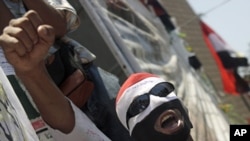The United States Wednesday joined human rights groups in expressing concern about moves by Egyptian authorities to prosecute political activists for insulting the military. A founding member of Egypt’s April 6th Youth Movement, Asmaa Mahfouz, is among those facing charges.
The State Department says U.S. officials have raised concerns directly with Cairo over the Asmaa Mahfouz case and other prosecutions that human rights groups say reflect stepped-up efforts by Egypt’s interim authorities to silence critics.
The 26-year-old Mahfouz, whose April 6th Youth Movement was one of the main organizing forces behind Egypt’s mass uprising earlier this year, faces charges of incitement and insulting the military after posts on the social website Twitter warning that the clampdown on dissent could provoke violence.
She is free after posting a bail of more than $3,000 but will face a military trial at a yet-to-be-determined date.
State Department Spokesperson Victoria Nuland says the United States believes all individuals should be allowed to peacefully exercise their right to freedom of expression, and that U.S. officials are concerned by the actions against Mahfouz and others being summoned to appear before military courts.
“We strongly support a democratic transition in Egypt. We view that transition as both positive and necessary and real democratic change in Egypt will serve the long-term interests of Egypt of the region and our relationship. Democracy is not only about elections. It's also about freedom of speech, it's about freedom of assembly, it's about respect for the rights of minorities, and about strong and accountable institutions," she said.
In the Twitter comments that offended authorities, Mahfouz said that if the Egyptian justice system does not deliver real rights, no one should be surprised if armed groups emerge and stage assassinations.
Denying incitement, she says she was only warning the country’s ruling military council that the absence of justice will bring chaos.
Amnesty International called on Cairo authorities to immediately drop the charges against Mahfouz, saying her comments do not represent a call to violence and that trying civilians in a military court is “deeply problematic.”
Human Rights Watch says the prosecution of Mahfouz is a “serious escalation” of efforts by Egyptian military leaders to silence critical voices.
The group’s Washington-based deputy director for the Middle East and North Africa, Joe Stork, says the case does not mean Egypt’s revolution has gone completely off the tracks, but that some officials still cling to the methods of the Hosni Mubarak era.
“There are many moving parts here. This is a sign that there are still people very much in power in Egypt who number one, feel threatened by the kind of changes that are being demanded on the street. And number two, are willing to use the same old laws, the same bad laws of the Mubarak era, to suppress speech, to suppress peaceful protests," he said.
Stork says the Mahfouz case is the just the latest in a “whole series” of prosecutions by the Egyptian military, which he said is increasingly setting narrower limits on what it will permit.
Human Rights Watch says military courts are currently trying groups of protestors arrested since June in Cairo and Alexandria for alleged offenses including chanting “offensive slogans” about the country’s de-facto ruler, Field Marshall Mohamed Hussein Tantawi.
The New York-based group says military courts have sentenced at least 10,000 civilians this year in unfair proceedings and that all should be re-tried in regular civilian courts.
The country’s ruling Supreme Council of the Armed Forces denies limiting freedom of expression but says it has moved against those who “cross the limits” of free speech to promote violence and defame the military.
US Concerned by Military Prosecution of Egyptian Activists




